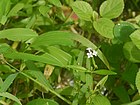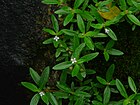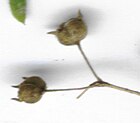Note: This is a project under development. The articles on this wiki are just being initiated and broadly incomplete. You can Help creating new pages.
Difference between revisions of "Hedyotis corymbosa"
(Created page with "{{stub}} ==Uses== {{Uses|}}, {{Uses|}}, {{Uses|}}, {{Uses|}}, {{Uses|}}, {{Uses|}}, {{Uses|}}, {{Uses|}}, {{Uses|}}, {{Uses|}}, {{Uses|}}.<ref name="Uses"/> ==Parts Used== {{...") |
(→External Links) |
||
| (3 intermediate revisions by the same user not shown) | |||
| Line 1: | Line 1: | ||
| − | + | [[File:Parppatakam (Tamil- பர்ப்படாகம்) (4801725131).jpg|thumb|right]] | |
| + | '''Hedyotis corymbosa''' is an erect or prostrate, sparsely branched annual plant with stems up to 40cm long that sometimes root at the nodes. The plant is harvested from the wild for local use as a food, medicine and source of a dye. | ||
==Uses== | ==Uses== | ||
| − | {{Uses|}}, {{Uses|}}, {{Uses|}}, {{Uses|}}, {{Uses|}}, {{Uses|}}, {{Uses|}}, {{Uses|}}, {{Uses|}}, {{Uses| | + | {{Uses|Stomach disorders}}, {{Uses|Sore eyes}}, {{Uses|Fever}}, {{Uses|Gastric irritation}}, {{Uses|Nervous depression}}, {{Uses|Jaundice}}, {{Uses|Viral infections}}, {{Uses|Cancer}}, {{Uses|Acne}}, {{Uses|Boils}}.<ref name="Uses"/> |
==Parts Used== | ==Parts Used== | ||
| − | {{Parts Used| | + | {{Parts Used|Leaves}}. |
==Chemical Composition== | ==Chemical Composition== | ||
| Line 10: | Line 11: | ||
==Common names== | ==Common names== | ||
| − | {{Common names|sa=|en=|gu=|hi=|kn=|ks=|ml=|mr=|pa=|ta=|te=}} | + | {{Common names|sa=Parpatah|en=Diamond Flower|gu=|hi=Daman pappar|kn=Parpata hullu|ks=|ml=Parppatakam|mr=Pitpapda|pa=|ta=Kattucayaver|te=Vernnela-vemu}} |
==Properties== | ==Properties== | ||
| Line 16: | Line 17: | ||
===Dravya=== | ===Dravya=== | ||
===Rasa=== | ===Rasa=== | ||
| − | |||
===Guna=== | ===Guna=== | ||
| Line 29: | Line 29: | ||
==Habit== | ==Habit== | ||
| − | {{Habit|}} | + | {{Habit|Annual}} |
==Identification== | ==Identification== | ||
| Line 48: | Line 48: | ||
==Mode of Propagation== | ==Mode of Propagation== | ||
| − | {{Propagation|}} | + | {{Propagation|Seeds}} |
==How to plant/cultivate== | ==How to plant/cultivate== | ||
| − | <ref name="How to plant/cultivate"/> | + | The plant has become a widely naturalized weed through the tropics and subtropics.<ref name="How to plant/cultivate"/> |
==Commonly seen growing in areas== | ==Commonly seen growing in areas== | ||
| − | {{Commonly seen|}}, {{Commonly seen|}}, {{Commonly seen|}}, {{Commonly seen|}}, {{Commonly seen|}}. | + | {{Commonly seen|Grassland with long grass}}, {{Commonly seen|Bushland}}, {{Commonly seen|Montane scrub}}, {{Commonly seen|Shallow soil on rocks}}, {{Commonly seen|Sandy river ridges}}. |
==Photo Gallery== | ==Photo Gallery== | ||
<gallery class="left" caption="" widths="140px" heights="140px"> | <gallery class="left" caption="" widths="140px" heights="140px"> | ||
| − | + | Parppatakam (Tamil- பர்ப்படாகம்) (4801725131).jpg | |
| + | Pitpapda (Marathi- पित्तपापडा) (2724996430).jpg | ||
| + | Pitpapra (Hindi- पित्तपापड़ा) (2725001128).jpg | ||
| + | Starr 011104-9091 Hedyotis corymbosa.jpg | ||
| + | Starr 030523-0123 Hedyotis corymbosa.jpg | ||
</gallery> | </gallery> | ||
| Line 64: | Line 68: | ||
<references> | <references> | ||
| − | <ref name="chemical composition">[ | + | <ref name="chemical composition">[Chemistry]</ref> |
| − | <ref name="Leaf">[ | + | <ref name="Leaf">[Morphology]</ref> |
| − | <ref name="How to plant/cultivate">[ | + | <ref name="How to plant/cultivate">[http://tropical.theferns.info/viewtropical.php?id=Oldenlandia+corymbosa Cultivation]</ref> |
<ref name="Uses">Indian Medicinal Plants by C.P.Khare</ref> | <ref name="Uses">Indian Medicinal Plants by C.P.Khare</ref> | ||
</references> | </references> | ||
==External Links== | ==External Links== | ||
| − | * [ ] | + | * [https://bioinfo.bisr.res.in/project/domap/plant_details.php?plantid=0052&bname=Hedyotis%20corymbosa Hedyotis corymbosa on bioinfo.bisr.res.in] |
| − | * [ ] | + | * [https://indiabiodiversity.org/species/show/265190 Hedyotis corymbosa on indiabiodiversity.org] |
| − | * [ ] | + | * [http://www.flowersofindia.net/catalog/slides/Diamond%20Flower.html Hedyotis corymbosa on flowersofindia.net] |
[[Category:Herbs]] | [[Category:Herbs]] | ||
| + | [[Category:Pages without herbs images]] | ||
Latest revision as of 13:34, 15 May 2020
Hedyotis corymbosa is an erect or prostrate, sparsely branched annual plant with stems up to 40cm long that sometimes root at the nodes. The plant is harvested from the wild for local use as a food, medicine and source of a dye.
Contents
- 1 Uses
- 2 Parts Used
- 3 Chemical Composition
- 4 Common names
- 5 Properties
- 6 Habit
- 7 Identification
- 8 List of Ayurvedic medicine in which the herb is used
- 9 Where to get the saplings
- 10 Mode of Propagation
- 11 How to plant/cultivate
- 12 Commonly seen growing in areas
- 13 Photo Gallery
- 14 References
- 15 External Links
Uses
Stomach disorders, Sore eyes, Fever, Gastric irritation, Nervous depression, Jaundice, Viral infections, Cancer, Acne, Boils.[1]
Parts Used
Chemical Composition
Common names
| Language | Common name |
|---|---|
| Kannada | Parpata hullu |
| Hindi | Daman pappar |
| Malayalam | Parppatakam |
| Tamil | Kattucayaver |
| Telugu | Vernnela-vemu |
| Marathi | Pitpapda |
| Gujarathi | |
| Punjabi | |
| Kashmiri | |
| Sanskrit | Parpatah |
| English | Diamond Flower |
Properties
Reference: Dravya - Substance, Rasa - Taste, Guna - Qualities, Veerya - Potency, Vipaka - Post-digesion effect, Karma - Pharmacological activity, Prabhava - Therepeutics.
Dravya
Rasa
Guna
Veerya
Vipaka
Karma
Prabhava
Habit
Identification
Leaf
| Kind | Shape | Feature |
|---|---|---|
Flower
| Type | Size | Color and composition | Stamen | More information |
|---|---|---|---|---|
| {{{5}}} |
Fruit
| Type | Size | Mass | Appearance | Seeds | More information |
|---|---|---|---|---|---|
Other features
List of Ayurvedic medicine in which the herb is used
Where to get the saplings
Mode of Propagation
How to plant/cultivate
The plant has become a widely naturalized weed through the tropics and subtropics.[4]
Commonly seen growing in areas
Grassland with long grass, Bushland, Montane scrub, Shallow soil on rocks, Sandy river ridges.
Photo Gallery
References
- ↑ Indian Medicinal Plants by C.P.Khare
- ↑ [Chemistry]
- ↑ [Morphology]
- ↑ Cultivation
External Links
- Ayurvedic Herbs known to be helpful to treat Stomach disorders
- Ayurvedic Herbs known to be helpful to treat Sore eyes
- Ayurvedic Herbs known to be helpful to treat Fever
- Ayurvedic Herbs known to be helpful to treat Gastric irritation
- Ayurvedic Herbs known to be helpful to treat Nervous depression
- Ayurvedic Herbs known to be helpful to treat Jaundice
- Ayurvedic Herbs known to be helpful to treat Viral infections
- Ayurvedic Herbs known to be helpful to treat Cancer
- Ayurvedic Herbs known to be helpful to treat Acne
- Ayurvedic Herbs known to be helpful to treat Boils
- Herbs with Leaves used in medicine
- Herbs with common name in Kannada
- Herbs with common name in Hindi
- Herbs with common name in Malayalam
- Herbs with common name in Tamil
- Herbs with common name in Telugu
- Herbs with common name in Marathi
- Herbs with common name in Sanskrit
- Herbs with common name in English
- Habit - Annual
- Index of Plants which can be propagated by Seeds
- Herbs that are commonly seen in the region of Grassland with long grass
- Herbs that are commonly seen in the region of Bushland
- Herbs that are commonly seen in the region of Montane scrub
- Herbs that are commonly seen in the region of Shallow soil on rocks
- Herbs that are commonly seen in the region of Sandy river ridges
- Herbs
- Pages without herbs images





